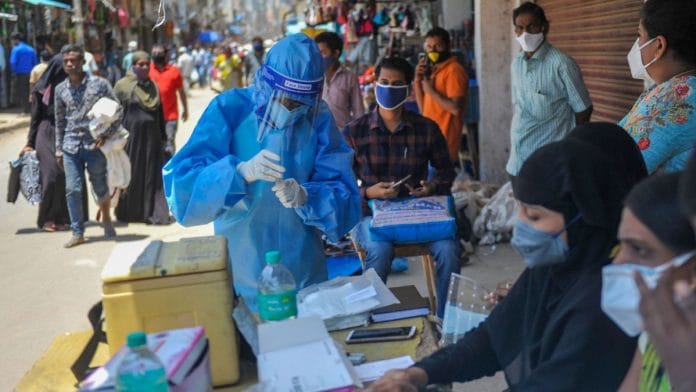New Delhi: In yet another instance showing how Covid-19 infection isn’t a guarantee to future immunity, The Lancet Infectious Diseases Tuesday reported the first confirmed case of the novel coronavirus reinfection in the US.
The journal noted this is the fifth documented case of reinfection in the world.
The researchers from Nevada in the US wrote that this means even people who have had Covid earlier need to take the same precautions as everyone else.
A 25-year-old man, resident of Washoe County in Nevada, had tested positive on 18 April. During follow-up check ups, he tested negative twice in May, but again tested positive on 5 June.
The Lancet stated the patient showed more severe symptoms in the second reinfection than in the first — an interesting observation as the standard belief is that in cases of reinfection the affliction is mild on both occasions.
The genomic analysis of the novel coronavirus showed that the differences in the strains were too much to be explained by short-term viral evolution within the body.
“Genetic discordance of the two SARS-CoV-2 specimens was greater than could be accounted for by short-term in vivo evolution. These findings suggest that the patient was infected by SARS-CoV-2 on two separate occasions by a genetically distinct virus,” researchers from the University of Nevada, Nevada State Public Health Laboratory and other organisations wrote in the article.
“Thus, previous exposure to SARS-CoV-2 might not guarantee total immunity in all cases. All individuals, whether previously diagnosed with Covid19 or not, should take identical precautions to avoid infection with SARS-CoV-2. The implications of reinfections could be relevant for vaccine development and application,” the researchers added.
Also read: Study documents 2 cases of reinfections in India, but experts say data doesn’t offer insight
Fifth case in the world
The first confirmed case of Covid reinfection was reported in Hong Kong in August. There, too, reinfection was confirmed by the variation in the strain of the virus.
Soon after that on 15 September, ICMR chief Dr Balram Bhargava had said: “Reinfection is very very rare in viral infections.
“I had given the example of measles. When a person has measles, they are supposed to be protected for life, but there are some reinfections occurring. Similarly, we have seen reinfections occurring in Covid-19, but it is not a matter of serious concern. Whenever reinfection has happened, both infections have been mild,” he had said.
However in Nevada, it was not the case as the patient reported more severe symptoms when he was re-infected. Unlike during the first time, the patient required hospitalisation and oxygen support. His symptoms included fever, headache, dizziness, cough, nausea, and diarrhoea.
“There are still many unknowns about SARS-CoV-2 infections and the immune system’s response, but our findings signal that a previous SARS-CoV-2 infection may not necessarily protect against future infection. It is important to note this is a singular finding and does not provide generalizability of this phenomenon,” said Mark Pandori of the Nevada State Public Health Laboratory and lead author of the study.
“While more research is needed, the possibility of reinfections could have significant implications for our understanding of Covid-19 immunity, especially in the absence of an effective vaccine. It also strongly suggests that individuals who have tested positive for SARS-CoV-2 should continue to take serious precautions when it comes to the virus, including social distancing, wearing face masks, and handwashing,” he added.
At least, three other reinfection cases have been confirmed globally in Belgium, the Netherlands, and Ecuador in August.
However, only the Ecuador reinfection case displayed worse disease outcome than the first infection. The other reinfection cases did not show more severe symptoms than the first infection.
Virus may have mutated, load may have been higher
In The Lancet article, the researchers offered several hypotheses on why the symptoms were more severe the second time.
“The mechanisms that could account for a more severe secondary infection can only be speculated. First, a very high dose of virus might have led to the second instance of infection and induced more severe disease. Second, it is possible that reinfection was caused by a version of the virus that was more virulent, or more virulent in this patient’s context. Third, a mechanism of antibody-dependent enhancement might be the cause, a means by which specific… immune cells become infected with virus by binding to specific antibodies,” the researchers wrote.
Another alternative explanation would be a simultaneous co-infection of both strains of the virus. However, this would mean that the second strain would have gone undetected in April.
Also read: Two confirmed Covid-19 reinfections in Telangana increase concerns about immunity







They need to scare people with reinfection if they want people to pay for vaccination. Otherwise many would not go for it and given so much investment has gone into it, they need to do this.